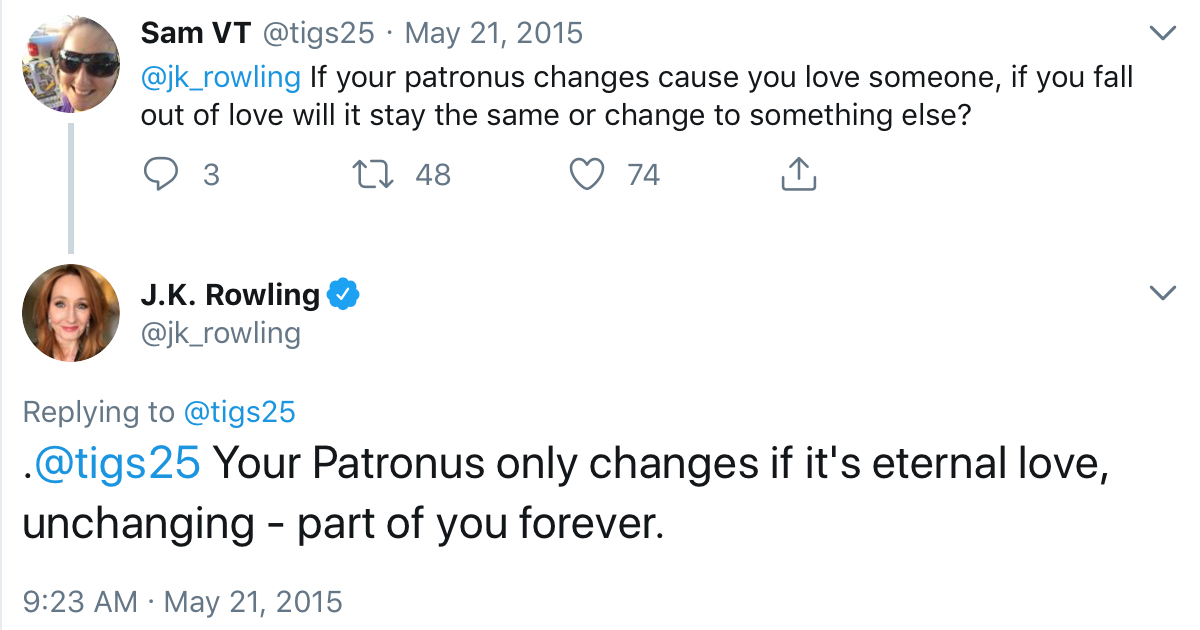A Patronus requires happy memories and the caster’s ability to recreate the emotional stimulus and infuse his or her entire presence with said reproduced emotion. The idea of swapping the emotional component of the spell for love has not been explained or fleshed out in canon that I can recall but has been explored in the fandom realm in numerous fan fictions. Varieties include a solid golden Prongs who could destroy the dementors and other creatures of sheer evil construct to a completely different avatar based on the type of love etc.
In this excerpt from Pottermore
Extract from Harry Potter and the Prisoner of Azkaban by J.K. Rowling
‘So...’ Professor Lupin had taken out his own wand, and indicated that
Harry should do the same. ‘The spell I am going to try and teach you
is highly advanced magic, Harry – well beyond Ordinary Wizarding
Level. It is called the Patronus Charm.’ ‘How does it work?’ said
Harry nervously. ‘Well, when it works correctly, it conjures up a
Patronus,’ said Lupin, ‘which is a kind of Anti-Dementor – a guardian
which acts as a shield between you and the Dementor.’ Harry had a
sudden vision of himself crouching behind a Hagrid-sized figure
holding a large club. Professor Lupin continued, ‘The Patronus is a
kind of positive force, a projection of the very things that the
Dementor feeds upon – hope, happiness, the desire to survive – but it
cannot feel despair, as real humans can, so the Dementors can’t hurt
it. But I must warn you, Harry, that the Charm might be too advanced
for you. Many qualified wizards have difficulty with it.’ ‘What does a
Patronus look like?’ said Harry curiously. ‘Each one is unique to the
wizard who conjures it.’ ‘And how do you conjure it?’ ‘With an
incantation, which will work only if you are concentrating, with all
your might, on a single, very happy memory.’ Harry cast about for a
happy memory. Certainly, nothing that had happened to him at the
Dursleys’ was going to do. Finally, he settled on the moment when he
had first ridden a broomstick. ‘Right,’ he said, trying to recall as
exactly as possible the wonderful, soaring sensation in his stomach.
‘The incantation is this –’ Lupin cleared his throat, ‘expecto
patronum!’ ‘Expecto patronum,’ Harry repeated under his breath,
‘expecto patronum.’ ‘Concentrating hard on your happy memory?’ ‘Oh –
yeah –’ said Harry, quickly forcing his thoughts back to that first
broom-ride. ‘Expecto patrono – no, patronum – sorry – expecto
patronum, expecto patronum –’ Something whooshed suddenly out of the
end of his wand; it looked like a wisp of silvery gas. ‘Did you see
that?’ said Harry excitedly. ‘Something happened!’ ‘Very good,’ said
Lupin, smiling. ‘Right then – ready to try it on a Dementor?’
It would be interesting to explore the arithmantical properties of the spell and see if supplying different strong emotions would affect the overall impact of the spell. JKR never really fleshed out the advanced structuring of spells or spell creation nor truly explained the spell analysis methodology of arithmancy enough to do so from canon. Or at least to my knowledge. It was not an integral part of the story so she most likely never needed to further explain it. Hermione may have been able to do well in the class but even she was no expert like Bill or Fleur would have been. Spell creation is danegerous to even experienced witches or wizards. Look at Luna Lovegood and her mother Selene. One wrong move and Selene was vaporized and the backlash permanently scrambled some wires in Luna and Xenophilus headsets so to speak.
From Pottermore
Arithmancy In the Muggle world, arithmancy is the practice of
assigning numerical value to words for the purpose of divination.
Although not much is known about the arithmancy taught at Hogwarts, it
can be presumed that the wizarding world practiced the same thing. In
Hermione’s words, it was ‘predicting the future with numbers’, and was
her favourite subject. Taught by Professor Vector, it involved a lot
of complicated homework and was a necessary subject for anyone hoping
to ever work as a curse-breaker at Gringotts bank. Bill Weasley must
have aced it, then.
That is about as much as I can find in canon but the 800,000+ fan fictions have lead to some interesting non canon explanations and applications from it being a base 7 mathematics to creation of software that can analyze and break down the numbers created during the spell analysis and note similar algorithms and categorize them so one can swap various portions with others and subsequently alter the spells structure and overall effect. (I would reference a few of the better ones but again there are too many fics with 100k words or more to search for quotes. If anyone else has specific explanations or examples in mind please post as comments)

